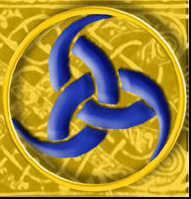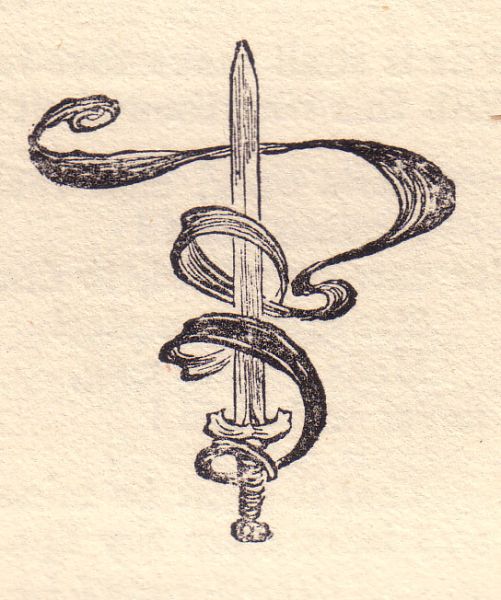
Terms of
Use
Submissions
~ By Courtesy of Others ~

Of the Slaying of Sigurd the
Volsung
From: "The Story of Sigurd the Volsung"
Then at high noon Brynhild sent for Gunnar and sought to whet him to
the slaying of Sigurd, for to such hatred was her love turned.
"I look upon thee," said Brynhild, "I know thy race and thy name,
Yet meseems the deed thou sparest, to amend thine evil and shame."
"Nought, nought," he said, "may amend it, save the hungry eyeless sword,
And the war without hope or honour, and the strife without reward."
"Thou hast spoken the word," said Brynhild, "if the word is enough, it is well.
Let us eat and drink and be merry, that all men of our words may tell!"
"O all-wise woman," said Gunnar, "what deed lieth under the tongue?
What day for the dearth of the people, when the seed of thy sowing hath
sprung?"
She said: "Our garment is Shame, and nought the web shall rend,
Save the day without repentance, and the deed that nought may amend."
"Speak, mighty of women," said Gunnar, "and cry out the name and the deed
That the ends of the Earth may hearken, and the Niblungs' grievous Need."
"To slay," she said, "is the deed, to slay a King ere the morn,
And the name is Sigurd the Volsung, my love and thy brother sworn."
She turned and departed from him, and he knew not whither she went;
But he took his sword from the girdle and the peace-strings round it rent,
And into the house he gat him, and the sunlit fair abode,
But his heart in the mid-mirk waded, as through the halls he strode,
Till he came to a chamber apart; and Grimhild his mother was there,
And there was his brother Hogni in the cloudy Niblung gear:
Him-seemed there was silence between them as of them that have spoken, and wait
Till the words of their mouths be accomplished by slow unholpen Fate:
But they turned to the door, and beheld him, and he took his sheathed sword
And cast it adown betwixt them, and it clashed half bare on the board,
And Grimhild spake as it clattered: "For whom are the peace-strings rent?
For whom is the blood-point whetted and the edge of thine intent?"
He said: "For the heart of Sigurd; and thus all is rent away
Betwixt this word and his slaying, save a little hour of day."
* * * * *
Again spake Grimhild the wise-wife: "Where then is Guttorm the brave?
For he blent not his blood with the Volsung's, nor his oath to Sigurd gave,
Nor called on Earth to witness, nor went beneath the yoke;
And now is he Sigurd's foeman; and who may curse his stroke?"
Then Hogni laughed and answered: "His feet on the threshold stand:
Forged is thy sword, O Mother, and its hilts are come to hand.
* * * * *
"Ho, Guttorm, enter, and hearken to the counsel of the wise!"
Then in through the door strode Guttorm fair-clad in hunter's guise,
With no steel save his wood-knife girded; but his war-fain eyes stared wild,
As he spake: "What words are ye hiding from the youngest Niblung child?
What work is to win, my brethren, that ye sit in warrior's weed,
And tell me nought of the glory, and cover up the deed?"
Then uprose Grimhild the wise-wife, and took the cup again;
Night-long had she brewed that witch-drink and laboured not in vain.
For therein was the creeping venom, and hearts of things that prey
On the hidden lives of ocean, and never look on day;
And the heart of the ravening wood-wolf and the hunger-blinded beast
And the spent slaked heart of the wild-fire the guileful cup increased:
But huge words of ancient evil about its rim were scored,
The curse and the eyeless craving of the first that fashioned sword.
So the cup in her hand was gleaming, as she turned unto Guttorm and spake:
"Be merry, King of the War-fain! we hold counsel for thy sake:
The work is a God's son's slaying, and thine is the hand that shall smite,
That thy name may be set in, glory and thy deeds live on in light."
Forth flashed the flame from his eyen, and he cried: "Where then is the foe,
This dread of mine house and my brethren, that my hand may lay him alow?"
"Drink, son," she said, "and be merry! and I shall tell his name,
Whose death shall crown thy life-days, and increase thy fame with his fame."
He drinketh and craveth for battle, and his hand for a sword doth seek,
And he looketh about on his brethren, but his lips no word may speak;
They speak the name, and he hears not, and again he drinks of the cup
And knows not friend nor kindred, and the wrath in his heart wells up,
That no God may bear unmingled, and he cries a wordless cry,
As the last of the day is departing and the dusk time drawing anigh.
Then Grimhild goes from the chamber, and bringeth his harness of war,
And therewith they array his body, and he drinketh the cup once more,
And his heart is set on the murder, and now may he understand
What soul is dight for the slaying, and what quarry is for his hand.
For again they tell him of Sigurd, and the man he remembereth,
And praiseth his mighty name and his deeds that laughed on death.
Now dusk and dark draw over, and through the glimmering house
They go to the place of the Niblungs, the high hall and glorious;
For hard by is the chamber of Sigurd: there dight in their harness of war
In their thrones sit Gunnar and Hogni, but Guttorm stands on the floor
With his blue blade naked before them: the torches flare from the wall
And the woven God-folk waver, but the hush is deep in the hall,
And those Niblung faces change not, though the slow moon slips from her height
And earth is acold ere dawning, and new winds shake the night.
Now it was in the earliest dawn-dusk that Guttorm stirred in his place,
And the mail-rings tinkled upon him, as he turned his helm-hid face,
And went forth from the hall and the high-seat; but the Kings sat still in their pride
And hearkened the clash of his going and heeded how it died.
Slow, all alone goeth Guttorm to Sigurd's chamber door,
And all is open before him, and the white moon lies on the floor
And the bed where Sigurd lieth with Gudrun on his breast,
And light comes her breath from her bosom in the joy of infinite rest.
Then Guttorm stands on the threshold, and his heart of the murder is fain,
And he thinks of the deeds of Sigurd, and praiseth his greatness and gain;
Bright blue is his blade in the moonlight--but lo, how Sigurd lies,
As the carven dead that die not, with fair wide-open eyes;
And their glory gleameth on Guttorm, and the hate in his heart is chilled,
And he shrinketh aback from the threshold and knoweth not what he willed.
Thereon he turned him again to the hall, and the Kings beheld his
unstained sword in the torch-light, but they cast him never a word.
Then shame and wrath urged him and he wended the second time to
Sigurd's chamber, but yet again the dread eyes of the Volsung were
open and he fled from their light to his biding brethren.
Now dieth moon and candle, and though the day be nigh
The roof of the hall fair-builded seems far aloof as the sky,
But a glimmer grows on the pavement and the ernes on the roof-ridge stir:
Then the brethren hist and hearken, for a sound of feet they hear,
And into the hall of the Niblungs a white thing cometh apace:
But the sword of Guttorm upriseth, and he wendeth from his place,
And the clash of steel goes with him; yet loud as it may sound
Still more they hear those footsteps light-falling on the ground,
And the hearts of the Niblungs waver, and their pride is smitten acold,
For they look on that latest comer, and Brynhild they behold:
But she sits by their side in silence, and heeds them nothing more
Than the grey soft-footed morning heeds yester-even's war.
But Guttorm clashed in the cloisters and through the silence strode
And scarce on the threshold of Sigurd a little while abode;
There the moon from the floor hath departed and heaven without is grey,
And afar in the eastern quarter faint glimmer streaks of day.
Close over the head of Sigurd the Wrath gleams wan and bare,
And the Niblung woman stirreth, and her brow is knit with fear;
But the King's closed eyes are hidden, loose lie his empty hands,
There is nought 'twixt the sword of the slayer and the Wonder of all Lands.
Then Guttorm laughed in his war-rage, and his sword leapt up on high,
As he sprang to the bed from the threshold and cried a wordless cry,
And with all the might of the Niblungs through Sigurd's body thrust,
And turned and fled from the chamber, and fell amid the dust,
Within the door and without it, the slayer slain by the slain;
For the cast of the sword of Sigurd had smitten his body atwain
While yet his cry of onset through the echoing chambers went.
Woe's me! how the house of the Niblungs by another cry was rent,
The wakening wail of Gudrun, as she shrank in the river of blood
From the breast of the mighty Sigurd: he heard it and understood,
And rose up on the sword of Guttorm, and turned from the country of death,
And spake words of loving-kindness as he strove for life and breath:
"Wail not, O child of the Niblungs! I am smitten, but thou shall live,
In remembrance of our glory, mid the gifts the Gods shall give!"
She stayed her cry to hearken, and her heart well nigh stood still:
But he spake: "Mourn not, O Gudrun, this stroke is the last of ill;
Fear leaveth the House of the Niblungs on this breaking of the morn;
Mayst thou live, O woman beloved, unforsaken, unforlorn!"
Then he sank aback on the sword, and down to his lips she bent
If some sound therefrom she might hearken; for his breath was well-nigh
spent:
"It is Brynhild's deed," he murmured, "and the woman that loves me well;
Nought now is left to repent of, and the tale abides to tell.
I have done many deeds in my life-days, and all these, and my love, they lie
In the hollow hand of Odin till the day of the world go by.
I have done and I may not undo, I have given and I take not again:
Art thou other than I, Allfather, wilt thou gather my glory in vain?"
There was silence then in the chamber, as the dawn spread wide and grey,
And hushed was the hall of the Niblungs at the entering-in of day.
Long Gudrun hung o'er the Volsung and waited the coming word;
Then she stretched out her hand to Sigurd and touched her love and her lord,
And the broad day fell on his visage, and she knew she was there alone,
And her heart was wrung with anguish and she uttered a weary moan:
Then Brynhild laughed in the hall, and the first of men's voices was that
Since when on yester-even the kings in the high-seat had sat.
William Morris, 1834-1896.
See the whole The Project Gutenberg eBook "The Story of Sigurd the Volsung".